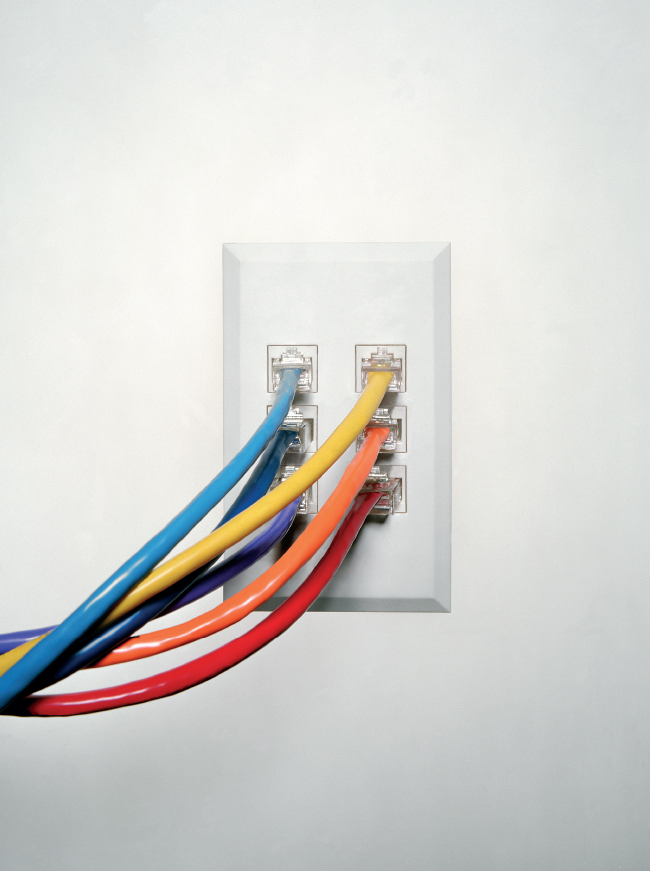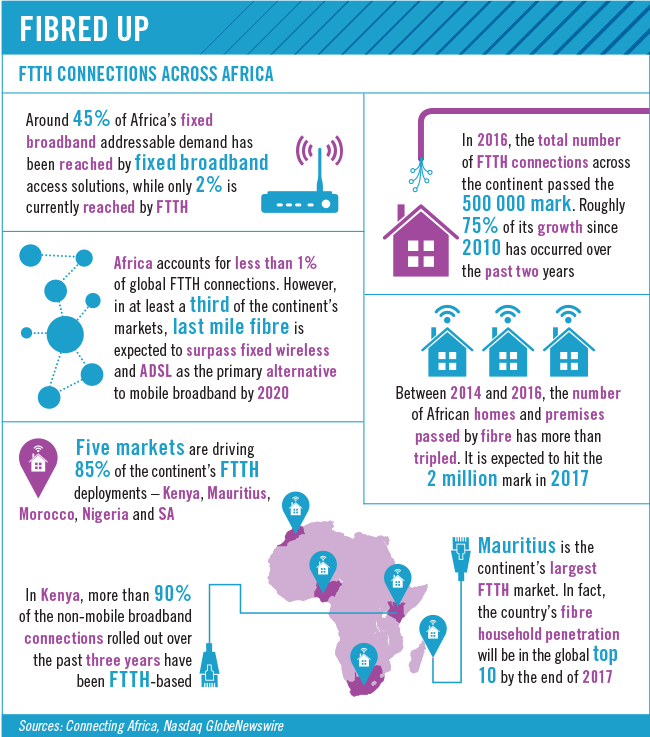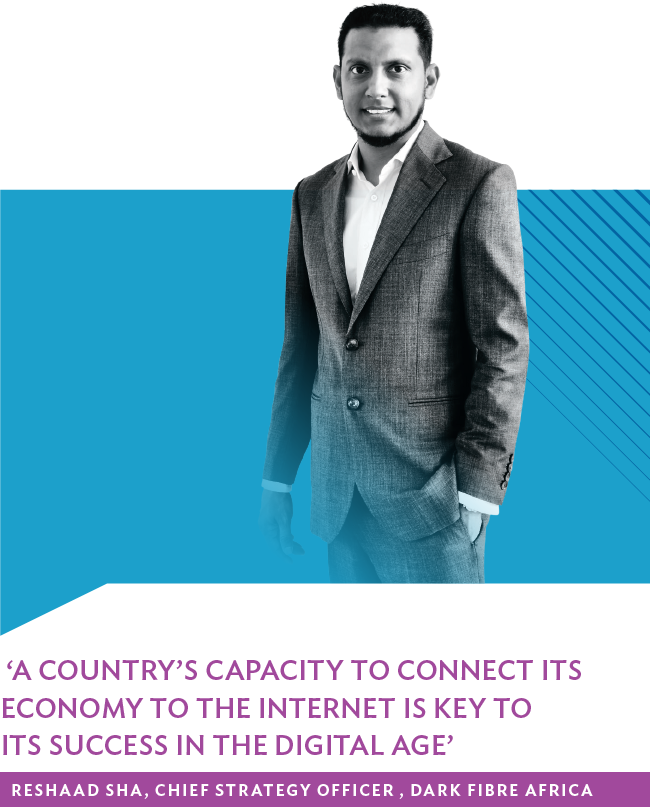As you sit in your suburban home or urban office, watching out of your front window as a team of technicians digs up the pavement to lay a line of fibre cables, chances are the last thing you will have on your mind is a trip to Mauritius. With its famous beach resorts, tropical tea plantations and giant tortoises, the Indian Ocean island seems a world away from the drills, spades and pickaxes, and booming roll-out that is SA’s fibre-to-the-home (FTTH), fibre-to-the-business (FTTB) and fibre-to-the-anywhere (FTTX) industry.
Yet small, unassuming Mauritius is leading the way when it comes to FTTX in Africa. In October, Mauritius Telecom was named the clear winner at the FTTH Council Africa awards ceremony. The country currently holds 16th place on the global ranking index for fibre deployment, giving it (at about 33%) the highest fibre penetration of any African country.
‘Mauritius Telecom, with strong support from the Mauritian government through their landmark Vision 2030 document and 2016/17 national budget, has shown that ubiquitous penetration is possible,’ FTTH Council Africa CEO Juanita Clark said at the ceremony. ‘Its target of almost 100% of homes having affordable access to download speeds of 100 Mbps by 2017 shows the value of strong partnership between government and its delivery partners.’
Council president Richard Came added that he applauded Mauritius Telecom and the Mauritian government for not only developing a national broadband strategy but also ensuring it was executed. ‘So often we see excellent broadband strategies announced but they never materialise,’ he said.
‘Mauritius has shown us that it’s possible to set goals and achieve them. Soon almost every Mauritian will have access to affordable, high-quality broadband, which will open new opportunities in education, healthcare and the economy of tomorrow.’
That last sentence sums up the social and business case that’s driving FTTH roll-out across Africa, and in SA especially. ‘A country’s capacity to connect its economy to the internet and to make these services available and accessible to its citizens and businesses is key to its success in the digital age,’ says Reshaad Sha, chief strategy officer at Dark Fibre Africa (DFA), which boasts the largest open-access, dark fibre infrastructure footprint in SA.
He argues that the deployment of fibre infrastructure and services in itself is a contributor to job creation and economic investment. ‘This is evident in DFA as a company, which has invested close to R7 billion in an open-access fibre network and created close to 700 permanent jobs in the company over the last nine years, excluding the job creation and economic participation of our sub-contractors and suppliers.’
FTTB deployments also enable SMEs to reduce their cost structures by having reliable access to cloud-based business applications, such as VoIP, payroll, collaboration and e-commerce platforms.
Jarryd Chatz, CEO of BitCo, an internet and telephony provider, says: ‘Historically fibre was a service that only larger organisations could afford while smaller companies had to be content with unreliable copper or mobile services which often resulted in a degraded service.
‘The affordability and accessibility of fibre now allows SMEs to enjoy uncompromised connectivity. Migrating to fibre will dramatically increase their efficiencies due to the speed and reliability of the connection. Fibre is also scalable and has longevity so it can grow as the business grows.’
The growth of the internet has revolutionised the way small companies promote and sell their products and services, says Clark. ‘Consumers are more and more leaning towards managing their lives online and the demand for a quick response is increasing. Companies are finding it increasingly important to have optimum, stable and secure internet speed.’
‘They also have a wider reach to markets through the use of cloud-based e-commerce platforms that enable them to market, transact and fulfil orders to clients, irrespective of location,’ says Sha.
‘The success of online businesses is evidence of how access to high-speed connectivity – which is fibre-dependent – has contributed to business and economic growth,’ he says. So that would explain the drilling and digging outside your window. And given the massive competitive advantages that fibre connectivity offers, it would explain why SA is currently in the midst of an enormous fibre boom.
In January, local IT news website MyBroadband published the results of a recent survey, which identified Cybersmart, Crystal Web and Axxess as the best FTTH and internet service providers in SA, based on value for money, network quality and billing and support.
The top seven – rounded out by Cool Ideas, Webafrica, Vox Telecom and Afrihost – each had average scores of more than 7.5 out of 10. The standard of service and product offering is high – as you would expect in what has become a fiercely competitive market.
That competitiveness is also bringing with it one of the typical side effects of a tech market boom, as companies emerge out of nowhere, grow quickly, and then either buy out their competitors or are bought themselves. Vodacom recently tried (but failed) to buy Neotel, which was subsequently acquired by pan-African group Liquid Telecom in a deal worth $435 million.
At the same time, Vox Telecom widened its network offering by buying Frogfoot Networks; Blue Label Telecoms bought a 45% stake in Cell C; and Vumatel acquired Fibrehoods.
Last June, Telkom confirmed that its FTTH service was, for the first time, cheaper than its traditional ADSL offering (thanks in large part to the absence of a forced landline rental). The move to fibre – and away from ADSL – is undeniable… And it makes perfect sense.
‘Fibre technology can touch every community and there are tremendous opportunities in the delivery of FTTX solutions in South Africa,’ Bradley Hemphill, MD of professional services firm EES Live said in a recent media statement.
‘Communities in which FTTX has been installed become increasingly sought after and the value of property in these connected communities increases. According to statistics released by FTTH America, a house that has FTTH increases in value by 7%.’
Hinting at its internet of things application, Hemphill adds that fibre creates smart homes – ‘for example, enabling a movie to be downloaded in a matter of seconds, enabling the home to be managed remotely and facilitating video surveillance’.
For years, Africa (including SA) has struggled to keep up with the developed world when it comes to bandwidth speed and broadband infrastructure but, according to SEACOM, a submarine cable operator, the FTTX revolution is turning that disadvantage on its head.
‘In recent years, South Africa’s lack of reliable internet infrastructure has been blamed for our slow digital progress. But lack of existing broadband infrastructure is a blessing in disguise – it leaves vast geographical areas open to the installation of brand new fibre infrastructure,’ the company states in a recent online post.
Describing 2017 as ‘the perfect year to break up with ADSL’, SEACOM adds that today’s digital companies need more than what DSL and wireless can provide. ‘It’s the ultimate “it’s not me, it’s you” situation for business owners, who are now presented with options that simply were not feasible or previously available.’
An FTTB connection, it says, offers ‘far superior speeds, allowing more employees, on more devices, to effectively use the network’. And because fibre connectivity is capable of simultaneous uploads and downloads, data travels unhindered in both directions.
‘Its fantastic speeds also mean that when it comes to high-demand data transfer – like voice and video transmissions – it easily runs circles around an ADSL connection. Fibre also enables better, faster and more efficient use of the myriad cloud apps available today, and trust us, you’re going to need your cloud tools.’
SEACOM points to a Gartner forecast that – by 2020 – a corporate no-cloud policy will be as rare as a no-internet policy is today. The cable operator adds that not only is FTTX a faster connection but it’s also ‘a critical enabler for business success in the future’.
As fibre extends its reach beyond business hubs and residential areas, away from your pavements and into SA’s previously unconnected areas, expect the competition to heat up even more – and expect businesses of all sizes to benefit.











